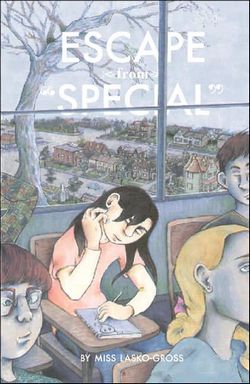- Comics
- Comics Reviews
- Manga
- Comics Reviews
- European Comics
- News
- Comics News
- Press Releases
- Columns
- Spotlight
- Digital Comics
- Webcomics
- Cult Favorite
- Back Issues
- Webcomics
- Movies
- Toys
- Store
- More
- About
By Leroy Douresseaux
April 8, 2007 - 10:44
 |
Lasko-Gross composes Escape from "Special" as a series of scenes - kind of like a "Best of" compilation of Melissa's interior life and interpersonal experiences. These are the anecdotes that provide either the best examples of Melissa's personality or are pivotal moments in her struggle to fit in with others. One could describe Melissa as fiercely intelligent, and she questions practically every sacred cow. Melissa simply challenges everything that is accepted as "the way it is" or "the way things are supposed to be." The precocious, spunky child even challenges her mostly bemused parents Jacquí and Tod.
Melissa wants to escape from being "special." At one point, she attends a "special" school because of her learning abilities. After than experience, she finds herself waging two interconnected wars. One is with herself dealing with her own doubts, fears, and insecurities. The other struggle deals with making herself part of the crowd - to stop being special and be ordinary. We have to accept this book's central thesis that Melissa is not part of the vulgar herd. Maybe, other students are as thoughtful as she is, questioning everything, but only Melissa has the audacity to speak her doubts and differences to the same people with whom she is trying to engage. She doesn't want to be the special one. Melissa wants to be like everyone else, but she has a rough time at making her square peg fit in the common round hole.
Perhaps, we can look back at much of our childhood troubles with others with a smile. Who can't manage a chuckle at Melissa's naïve (or maybe wise) view of mortality in "Cheese Steak of the Damned?" What makes "Escape from "Special" special is Lasko-Gross' ability to recreate the deeply personal confusing interior life of a particular young person and cast it as a narrative that is familiar to her readers.
One may accept Escape from "Special" as semi-autobiographical, but it is as timeless as it is timely. With her unsentimental coming-of-age tale, Lasko-Gross has tapped into the experiences of every adult who found that he or she simply didn't fit in with anyone or at least had difficulty fitting in. This graphic novel proposes that a person may try to be accepted even if his or her ideas and notions are not acceptable.
With that in mind, I can't help believing that Escape from "Special" is aimed at the Direct Market's older reading base actually also deserves a space on the shelves of juvenile fiction. I think many young readers could use this book while they are young.